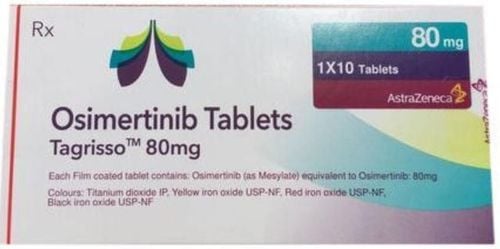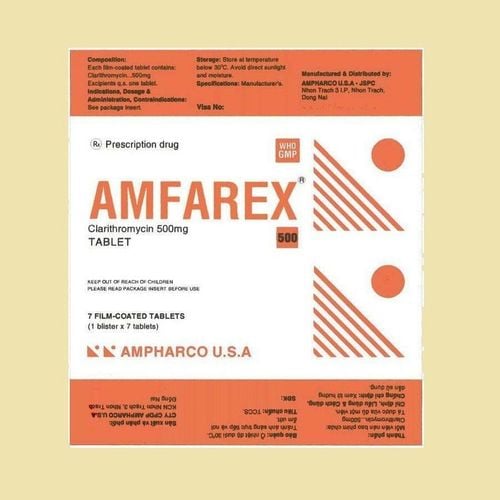This is an automatically translated article.
Claromycin is a prescription antibiotic for subjects with bacterial infections. Let's learn more about Clariomycin in the following article.
1. What is Clariomycin?
Clariomycin belongs to the category of antiparasitic, antifungal and antiviral drugs. Medicines are used as directed by the doctor/pharmacist. Claromycin is manufactured by TW1 Pharmaceutical Joint Stock Company (Pharbaco) - VIETNAM, under registration number VNA - 4329 - 05.
The main ingredient in Claromycin is the 500mg active ingredient Clarithromycin and excipients. Packed in white 500mg claromycin box, blue drug name printed in blue.
Clariomycin is prepared in the form of film-coated tablets, boxed in 2 blisters, 10 blisters x 5 tablets.
2. What are the effects of Clariomycin?
Clarithromycin itself contains the active ingredient Clarithromycin - a semi-synthetic antibiotic.
Clarithromycin contained in Claromycin is a new generation 14C Macrolid. It is semisynthetic from erythromycin with a methoxy substituent at position C-6 of the macrolide ring.
This structural change causes the active ingredient Clarithromycin in the drug Clarithromycin to have a broader antibacterial spectrum, increasing its concentration in tissues. In addition, it also helps to improve stability in the acidic environment of the stomach. Thus reducing the side effects of Clariomycin on the digestive system.
Clarithromycin itself - the ingredient in Claromycin also has antibacterial effects thanks to binding to a specific position on the 50s ribosome of susceptible bacteria. From there, the Clarithromycin contained in Claromycin can effectively inhibit the protein and kill bacteria.
The drug Clariomycin is effective against bacteria such as:
Staphylococcus aureus; Streptococcus pyogenes; Streptococcus pneumoniae; Streptococcus agalactiae; Hemophilus influenzea; Hemophilus para influenzea; Moraxella (Branhamella) catarrhalis; gonococcal gonorrhea; Legionella pneumophila; Bordetella pertussis; HP bacteria ; Clostridium perfringens; Peptococcus species; Propionibacterium acnes; Mycoplasma pneumoniae; Ureaplasma urealyticum; ... Besides, Clarithromycin contained in Claromycin is also effective in other microorganisms such as:
Chlamydia trachomatis; Toxoplasma gondii; Mycobacterium avium; Mycobacterium leprea; Mycobacterium Kansasii; Mycobacterium chelonae; Mycobacterium fortuitum; Mycobacterium intracellulare; ... Clariomycin is well absorbed from the gastrointestinal tract after oral administration. After taking Clariomycin, it will change according to the first metabolic mechanism. Clariomycin is metabolised by the liver, excreted in the feces, bile and excreted unchanged in the urine.
3. Indications for Clariomycin
Claromycin has broad-spectrum antibacterial action, usually indicated in the following cases:
Tonsillitis ; otitis media; Acute sinusitis; Bronchitis ; Pneumonia; Diphtheria ; Whooping cough; Opportunistic infections; Gastric ulcers caused by HP ; ... To avoid drug resistance, only use Clariomycin according to instructions and indications.
3. Dosage and how to use Clariomycin
Clariomycin is in the form of film-coated tablets, so you can drink it directly with filtered or boiled water.
The recommended dose of Claromycin for adults is 250mg/day x 2 times for 7 days. If the infection is severe, the dose of claromycin can be adjusted to 500 mg/day x 2 times for 14 days.
For children, Claromycin is used at a dose of 7.5mg/kg body weight x 2 times/day. The maximum can be used claromycin 500mg / day for 7-10 days. In addition, depending on the condition of the infection, the doctor may adjust the dose of claromycin.
For cases of duodenal ulcer caused by HP bacteria, can use 500mg x 2 times in 07 days with Omeprazole 40mg x 2 times/day
For people with kidney failure, the dose of Claromycin can be reduced by 1⁄ 2 total doses/day depending on condition.
4. Contraindications Clariomycin
Clariomycin is not used for subjects who are allergic to the ingredients and excipients in the drug. In addition, Clariomycin is contraindicated when used with:
Ergot derivatives; Cisaprid; Pimozide; Terfenadine ; ... Do not use Clariomycin for contraindicated subjects.
5. Clariomycin interactions
Clariomycin can cause interactions when used with drugs such as:
Birth control pills; Warfarin; Ergot; Triazolam; Lovastatin; Disopyramide; Phenytoin ; Cyclosporin; Klacid; Terfenadine; Zidovudine ; Omeprazole; ... Inform the doctor about the drugs you are taking when prescribed Clariomycin.
6. Clariomycin side effects
Clariomycin is effective in treating all types of infections as indicated. When taking Clariomycin you may also experience side effects including:
Nausea; Vomit; Diarrhea ; Stomachache; Undigested; Headache ; Allergy; Medal; Stevens-Johnson syndrome ; Taste disorder; Worried; Insomnia; Illusion ; Mental disorders; Confusion; Dizzy; Loss of hearing; Pseudomembranous colitis; Liver dysfunction; Hepatitis ; Jaundice; Liver failure; ... You need to monitor and inform your doctor/pharmacist about the side effects when taking Clariomycin for advice and treatment.
7. Clariomycin Warnings and Precautions
Those who need to be careful when using Clariomycin include:
Liver/kidney failure; People who are superinfected; In addition, co-administration of Clarithromycin with drugs metabolized by the cytochrome P450 system may also increase serum concentrations of Clarithromycin. Therefore, be careful when you want to combine.
Pay attention to caution when using the antibiotic Clariomycin.
8. Pregnancy, breast-feeding, driving and operating machines taking Clariomycin
Pregnant women: There are no data on the safety of using Clariomycin; Breast-feeding: There are no data on the safety of taking claromycin; Driving and operating machinery should be cautious because Clariomycin can cause insomnia, dizziness...
9. Clariomycin storage
Clariomycin is well preserved in cool, dry conditions, at room temperature. Above is all information about Claromycin, patients need to carefully read the instructions for use, consult a doctor / pharmacist before using. Note, Claromycin is a prescription drug, you absolutely must not buy the drug and treat it at home because you may encounter unwanted side effects.













